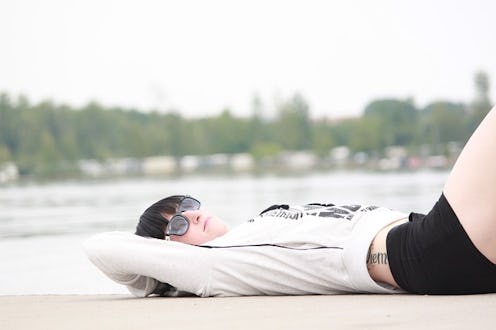Life
The Science Behind Why We Sleep

We spend a major portion of our lives tucked between the sheets, and yet many of us know very little about the “why”s and “how”s of sleep. This video about the science of sleep asks the important and surprisingly tricky question: Why do we sleep? The answer is … wait for it … er, no one is really sure.
There are a lot of theories as to why we have to power down for a third of our days. Joe Hanson, host and creator of It’s OK To Be Smart from PBS Digital Studios, points out that, even if we don’t know precisely what sleep does, we do know that it is absolutely vital: extreme sleep deprivation, for example, has been shown to cause seizures and even death in animals. Some common theories as to why we sleep don’t fully account for its importance in our lives and health. Hanson explains that, for instance, while we do quite a bit of “general biological upkeep” (such as “cellular repair,” “protein synthesis,” and so on) in our sleep, we also perform these activities when we’re awake.
One theory about the purpose of sleep is that sleep allows us to, as Hanson puts it, “flush out all the neurogarbage” that builds up in our brain cells and neurons. (Can I just point out that “neurogarbage” is a fantastic word? I’ve decided that “Neurogarbage” will be the title of my undoubtedly bestselling memoir). Another theory suggests that sleep is the only time that our prefrontal cortexes have a chance to rest.
As Hanson points out, when you think about it from an evolutionary stand point, sleep doesn’t make a lot of sense — after all, sleep represents an extended time when animals can’t escape from predators. Certain animals have evolved to accommodate sleep in weird ways. Dolphins, for instance, avoid drowning by sleeping with only one half of their brains at a time. Baby dolphins have to get by on taking short naps while being supported by their parents. (How cute is that?!)
Although sleep still holds a lot of mysteries, what we do know is that we all need sleep — regularly and abundantly. The average adult only gets 6.5 hours of sleep, and the average teen gets about 5 — just over half of the 8.5 to 9.5 hours of sleep recommended for teens by the American Academy of Pediatrics. Adults between the ages of 18 and 64 should be aiming for seven to nine hours, according to the Sleep Foundation. One barrier for sleep for many people is exposure to bright light at night. Our circadian rhythms — the bodily rhythms that tell us when to be asleep and awake — are affected by light and darkness. When it’s light, our bodies think it’s time to be awake, and when it’s dark, our bodies hit the snooze button. By constantly being tied to light sources at night, like computer and phone screens, we can throw off our circadian rhythms and make it difficult for our bodies to know when to sleep. As Hanson explains, “Depression, heart disease, diabetes, and cancer have all been linked to chronic overexposure to artificial light.”
To give yourself a better night’s sleep, try to put away your electronic devices in the hours before bedtime, and try to have a regular sleep schedule. Avoiding caffeine in the afternoons and evenings can also help you to get the zzzs you need.
Watch the whole video below:
Images: Pexels; YouTube (4)